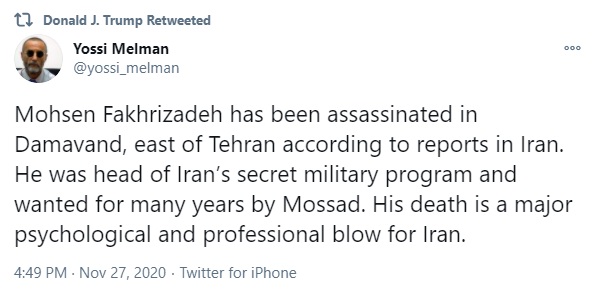
Iranian nuclear scientist Mohsen Fakhrizadeh was assassinated near Tehran on November 27, 2020. File photo: Tasnim news
Mohsen Fakhrizadeh was “assassinated by terrorist agents in the surroundings of Tehran,” reported Tasnim news agency, affiliated with the Islamic Revolutionary Guard Corps (IRGC).
Iranian media reported there was an explosion followed by a shootout between the attackers and Fakhrizadeh’s security guards on the road entering Absard, a city in central Damavand country, Tehran province.
He was brought to hospital, but efforts to save him failed, the Ministry of Defense announced, according to Fars News.
The head of the IRGC Hossein Salami said Israel was responsible for the assassination and vowed to seek revenge, Tasnim news reported.
Fakhrizadeh was director of Research and Innovation at the Ministry of Defense. According to Tasnim news, he led a team that developed a coronavirus testing kit and was working on a vaccine.
He has been dubbed the “father” of Iran’s drive for a nuclear weapon. He was identified by the UN Security Council in 2007 as a key person in Iran’s nuclear weaponisation efforts as a senior scientist at the Ministry of Defense Armed Forces Logistics and former head of the Physics Research Centre. Iran had refused requests from the International Atomic Energy Agency (IAEA) to interview Fakhrizadeh.
In a 2018 reveal, just days before US President Donald Trump pulled out of the nuclear deal with Iran, Israeli Prime Minister Benjamin Netanyahu claimed to have documents of Iran’s continued nuclear weapon ambitions and named Fakhrizadeh as the head of the project, known as the Amad plan. Tehran ordered the Amad plan to halt work in late 2003, but Netanyahu claimed the work continued under the guise of research at the Organization of Defensive Innovation and Research (SPND), headed by Fakhrizadeh.
On March 22, 2019, the US sanctioned Fakhrizadeh.
Iran's Foreign Minister Mohammad Javad Zarif said there were "serious indications" Israel was behind the assassination and called on the international community and European Union to condemn this "act of state terror."
Terrorists murdered an eminent Iranian scientist today. This cowardice—with serious indications of Israeli role—shows desperate warmongering of perpetrators
— Javad Zarif (@JZarif) November 27, 2020
Iran calls on int'l community—and especially EU—to end their shameful double standards & condemn this act of state terror.
Iran's Chief of Staff of the Armed Forces, Maj. Gen. Mohammad Bagheri, vowed "severe revenge."
"Terrorist groups and the leaders and the perpetrators of this cowardly attempt should know that severe revenge awaits them," he said, IRNA reported.
US President Donald Trump retweeted a tweet from Israeli journalist Yossi Melman in which he said Fakhrizadeh was wanted by Mossad for years and described the assassination as a “major psychological and professional blow for Iran.”

Fakhrizadeh’s assassination will likely heighten already elevated tensions as Tehran waits for US President-elect Joe Biden to take over the helm in Washington and, possibly, return to the nuclear deal. Biden has signaled he could seek to re-enter the nuclear agreement.
Iran’s President Hassan Rouhani said on Wednesday it would be “very easy to settle the problems” with the US if Biden showed a willingness to respect international commitments and provide compensation for the impact of two years of crippling sanctions.
"We hope that the next administration will explicitly condemn Trump's policies against Iran and make up for its anti-human rights and terrorist acts, the wrong policies pursued by the previous government over the past four years in its first steps," Rouhani said in a cabinet meeting.
A day earlier, however, Supreme Leader Ali Khamenei appeared less optimistic. “We tried to remove the sanctions through negotiations one time, but it was fruitless,” he said, adding that the solution would be found within Iran, not externally.
Rouhani, under whose leadership Iran entered the nuclear deal, does not have long to salvage a hallmark achievement of his time in office. Iranians will go to the polls in June and indications are hardliners have gained ground, partly spurred on by Trump’s anti-Iran policies.
This year began with Washington assassinating Gen. Qasem Soleimani and, though no claim of responsibility has yet been made, comparisons are being drawn with the killing of Fakhrizadeh. The same hashtag, “hard revenge,” has trended in Iran after both assassinations.
Engulfed in an economic crisis, partly caused by US sanctions, Tehran may, however, be forced to concede and talk with European signatories of the nuclear deal to try and revive some agreement between the Islamic Republic and Western powers.
Updated at 11:37 pm








Comments
Rudaw moderates all comments submitted on our website. We welcome comments which are relevant to the article and encourage further discussion about the issues that matter to you. We also welcome constructive criticism about Rudaw.
To be approved for publication, however, your comments must meet our community guidelines.
We will not tolerate the following: profanity, threats, personal attacks, vulgarity, abuse (such as sexism, racism, homophobia or xenophobia), or commercial or personal promotion.
Comments that do not meet our guidelines will be rejected. Comments are not edited – they are either approved or rejected.
Post a comment